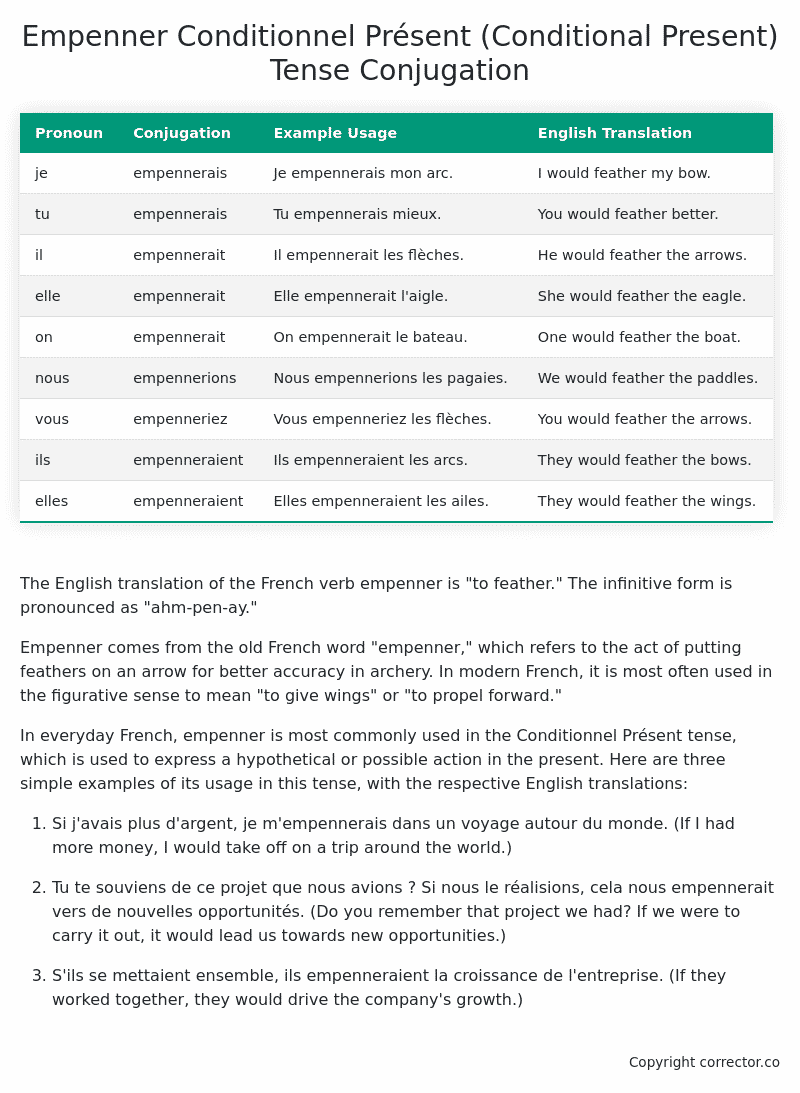Conditionnel Présent (Conditional Present) Tense Conjugation of the French Verb empenner
Introduction to the verb empenner
The English translation of the French verb empenner is “to feather.” The infinitive form is pronounced as “ahm-pen-ay.”
Empenner comes from the old French word “empenner,” which refers to the act of putting feathers on an arrow for better accuracy in archery. In modern French, it is most often used in the figurative sense to mean “to give wings” or “to propel forward.”
In everyday French, empenner is most commonly used in the Conditionnel Présent tense, which is used to express a hypothetical or possible action in the present. Here are three simple examples of its usage in this tense, with the respective English translations:
-
Si j’avais plus d’argent, je m’empennerais dans un voyage autour du monde. (If I had more money, I would take off on a trip around the world.)
-
Tu te souviens de ce projet que nous avions ? Si nous le réalisions, cela nous empennerait vers de nouvelles opportunités. (Do you remember that project we had? If we were to carry it out, it would lead us towards new opportunities.)
-
S’ils se mettaient ensemble, ils empenneraient la croissance de l’entreprise. (If they worked together, they would drive the company’s growth.)
Table of the Conditionnel Présent (Conditional Present) Tense Conjugation of empenner
| Pronoun | Conjugation | Example Usage | English Translation |
|---|---|---|---|
| je | empennerais | Je empennerais mon arc. | I would feather my bow. |
| tu | empennerais | Tu empennerais mieux. | You would feather better. |
| il | empennerait | Il empennerait les flèches. | He would feather the arrows. |
| elle | empennerait | Elle empennerait l’aigle. | She would feather the eagle. |
| on | empennerait | On empennerait le bateau. | One would feather the boat. |
| nous | empennerions | Nous empennerions les pagaies. | We would feather the paddles. |
| vous | empenneriez | Vous empenneriez les flèches. | You would feather the arrows. |
| ils | empenneraient | Ils empenneraient les arcs. | They would feather the bows. |
| elles | empenneraient | Elles empenneraient les ailes. | They would feather the wings. |
Other Conjugations for Empenner.
Le Present (Present Tense) Conjugation of the French Verb empenner
Imparfait (Imperfect) Tense Conjugation of the French Verb empenner
Passé Simple (Simple Past) Tense Conjugation of the French Verb empenner
Passé Composé (Present Perfect) Tense Conjugation of the French Verb empenner
Futur Simple (Simple Future) Tense Conjugation of the French Verb empenner
Futur Proche (Near Future) Tense Conjugation of the French Verb empenner
Plus-que-parfait (Pluperfect) Tense Conjugation of the French Verb empenner
Passé Antérieur (Past Anterior) Tense Conjugation of the French Verb empenner
Futur Antérieur (Future Anterior) Tense Conjugation of the French Verb empenner
Subjonctif Présent (Subjunctive Present) Tense Conjugation of the French Verb empenner
Subjonctif Passé (Subjunctive Past) Tense Conjugation of the French Verb empenner
Subjonctif Imparfait (Subjunctive Imperfect) Tense Conjugation of the French Verb empenner
Subjonctif Plus-que-parfait (Subjunctive Pluperfect) Tense Conjugation of the French Verb empenner
Conditionnel Présent (Conditional Present) Tense Conjugation of the French Verb empenner (this article)
Conditionnel Passé (Conditional Past) Tense Conjugation of the French Verb empenner
L’impératif Présent (Imperative Present) Tense Conjugation of the French Verb empenner
L’infinitif Présent (Infinitive Present) Tense Conjugation of the French Verb empenner
Struggling with French verbs or the language in general? Why not use our free French Grammar Checker – no registration required!
Get a FREE Download Study Sheet of this Conjugation 🔥
Simply right click the image below, click “save image” and get your free reference for the empenner Conditionnel Présent tense conjugation!

Empenner – About the French Conditionnel Présent (Conditional Present) Tense
Formation
Common Everyday Usage Patterns
Expressing Polite Requests
Expressing Hypothetical Situations
Expressing Doubt or Uncertainty
Interactions with Other Tenses
Present Tense
Past Tense
Future Tense
Conditional Perfect
Summary
Want More?
I hope you enjoyed this article on the verb empenner. Still in a learning mood? Check out another TOTALLY random French verb conjugation!


